Mother Of Slain Protester Sentenced To 13 Years In Prison
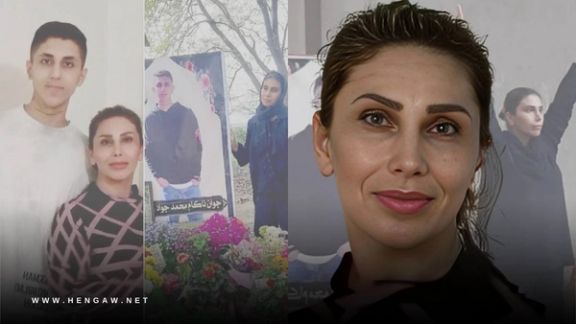
Mahsa Yazdani, the mother of Mohammad Javad Zahedi, one of the casualties of Iran’s nationwide protests in 2022, has been sentenced to 13 years in prison.

Mahsa Yazdani, the mother of Mohammad Javad Zahedi, one of the casualties of Iran’s nationwide protests in 2022, has been sentenced to 13 years in prison.
Yazdani was sentenced in the Revolutionary Court of Sari, northern Iran, under charges including insulting sanctities, endangering state security and insulting the Supreme Leader of the Islamic Republic, Hengaw Human Rights organization reported.
Under the law on the combination of sentences, her most severe punishment, which is five years in prison, will be enforceable.
Mitra Zahedi, the daughter of Yazdani, shared in an Instagram story: "What will happen to my three-year-old brother? Who is responsible for all this injustice?"
Mohammad Javad Zahedi was killed by the gunfire of security forces during the nationwide protests in Sari at the age of 20 in September last year.
Since September 2022, when widespread anti-regime protests broke out, security forces have killed well over 500 civilians and severely wounded hundreds. Many young protesters were targeted by shotgun pellets in the face and lost one or both eyes. The regime also arrested 22,000 people, including journalists and hundreds of minors.
Yazdani has always been the voice for justice for her slain son in the past year and has been alongside other families of the victims of the protests.
Initially detained by security forces in Sari, she was transferred to an unknown location on August 22 before being released on bail on September 25. An immediate sentence has been issued for her.
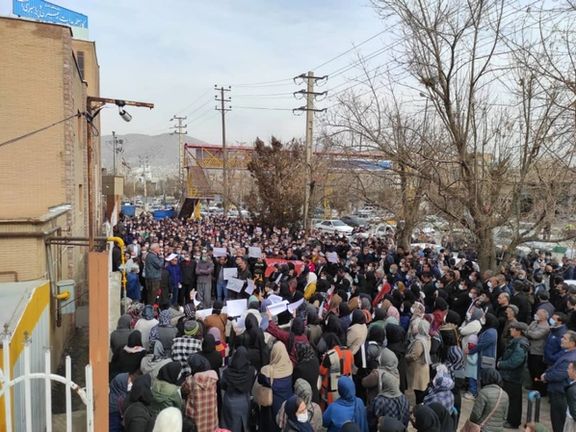
The Iranian Teachers' Association has released a statement condemning the death of Armita Geravand, who lost her life after a confrontation with hijab enforcers.
The association's statement acknowledges Armita, along with Mahsa Amini and other young girls, as “courageous fighters who took a stand against the authoritarian regime's ideological policies. Their unwavering resilience came at the ultimate cost of their lives.”
On October 1, Armita, 16, fell into a coma after an encounter with hijab enforcers in the Tehran subway. While the government has attempted to obscure the details of the incident, it appears that she was pushed by a female agent, resulting in a severe head injury.
Security measures were taken to prevent the dissemination of information or photographs or CCTV footage from the scene at Tehran's Fajr Hospital. She was subsequently declared brain dead and died in hospital on Saturday.
On Monday, the association, which stands bravely against the Islamic regime in the face of continued oppression of dissenting voices, including targeting academia, said: “Armita's case is one of several in which young girls have paid a heavy price for their defiance in advocating for optional hijab."
It stated that the option to wear hijab, mandated by the regime since its formation in 1979, "plays a pivotal role in advancing the democratic process of the Iranian people".
The group said: "Gender equality is an essential component of democracy, and the pursuit of optional hijab represents a realistic and achievable aspiration, vital for the realization of this democratic process."
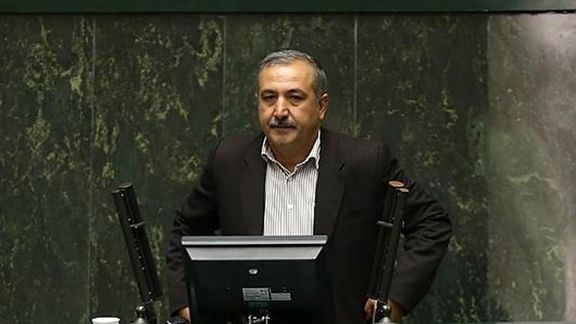
An Iranian Member of Parliament has exposed a widespread campaign of purges, suspensions, and dismissals affecting school administrators across the country.
Jalal Mahmoudzadeh, speaking on Sunday, provided alarming statistics, stating that approximately 15,000 to 20,000 school administrators have been replaced since the appointment of Reza Morad Sahraei as the Minister of Education.
The "purification process," as described by the MP, has extended its reach from universities to the education sector, resulting in the sidelining of teachers, school administrators, and even the expulsion of professors. The campaign shows no signs of slowing down.
The developments come on the heels of Reza Morad Sahraei's announcement last month that a "transformation plan" would be implemented in 5,000 schools during the current Iranian year, scheduled to conclude on March 20, 2024. The plan was initiated after a wave of anti-government protests involving numerous school students. Sahraei has committed to ongoing changes and expansion of the program.
The term "political purification," widely discussed in Iranian media, extends beyond educational institutions. Various organizations and institutions have faced similar purges as hardline elements of the regime sideline their rivals. The notion of "purification" was initially coined by former Parliament Speaker Ali Larijani to describe the actions of ultraconservative allies of President Raisi, aiming to consolidate government power by marginalizing other politicians and officials.

Security forces have arrested an unknown number of people who attended the funeral of Armita Geravand, the latest victim of Iran’s hijab enforcement.
The Iranian teenager died Saturday after about a month in coma for brain damage she suffered during a violent encounter with hijab enforcers deployed at Tehran’s subway stations. Her body was laid to rest at Tehran’s Behesht-e Zahra cemetery amid a heavy security presence.
Hengaw, a Kurdish human rights group, said Sunday that several of Armita’s relatives were arrested at her funeral service while the participants chanted against the regime. Her body was reportedly not released to the family until the security apparatus made sure that her family home, the hospital where she died and her burial site were surrounded by security agents.
At the funeral, not only were security forces stationed at the burial site, but at least three 360-degree cameras were installed there to record the service and detect anyone speaking against the government. Agents, who hugely outnumbered the funeral participants, also prevented people from recording the event and confiscated cell phones of the participants who tried to film the funeral.
It remains unknown what exactly happened on October 1 when Armita was confronted by morality police. The regime released doctored footage of her at the subway to exonerate its hijab enforcers. The widely accepted narrative is that a woman agent pushed her, and Armita fell and hit her head on the ground. However, authorities seem to have failed to convince Iranians, who believe hijab enforcers were responsible for her death. Authorities claim her head injury was caused by low blood pressure and fainting.
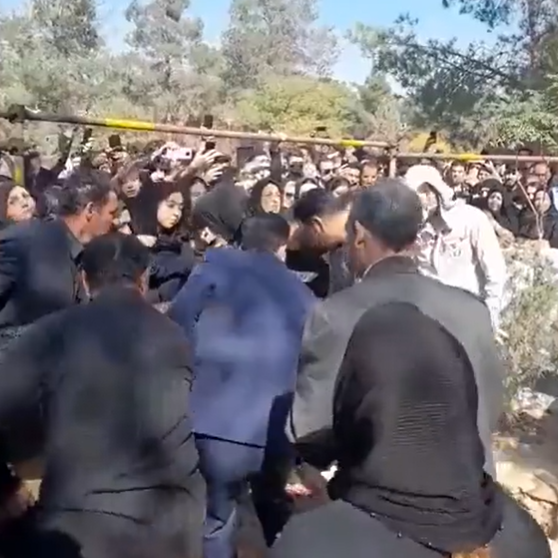
To prevent the repeat of anti-regime protests sparked by the death of Mahsa Amini at the hands of hijab police, Iranian authorities have imposed a full ban on reporting about Armita's death. Following the death of Mahsa Amini in September 2022, the Iranian clerical regime is worried about a resurgence of the extended anti-establishment protests and the 'Women, Life, Freedom movement' seen last year.
The circumstances of this latest case closely resembles that of Amini. In both instances, the regime denied any wrongdoing but pressured the families to refrain from speaking to the media.
The death of Armita has reignited anti-regime sentiments with people starting chanting slogans from their rooftops and windows on Saturday night.
Narges Mohammadi, the imprisoned human rights activist who recently received the Nobel prize for peace, issued a statement from prison saying, “Armita, full of the zest of life, was sent to her death because she had no intention of concealing her beautiful hair under compulsory hijab rules."
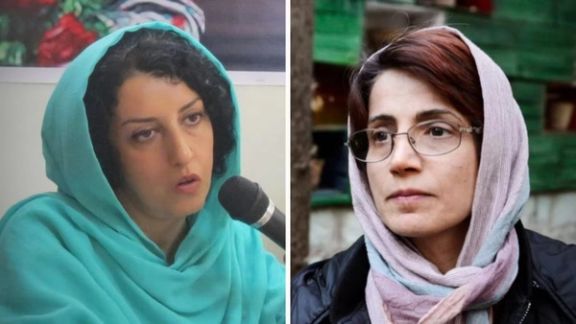
Prominent female dissident Zahra Rahnavard, under house arrest since 2011 along with her husband Mir-Hossein Mousavi as leaders of Iran's anti-regime Green Movement, warned the Islamic Republic against fighting against Iranian women and girls. She called on the regime to abolish the "wretched law of compulsory hijab," or the "stigma of suppressing girls will remain on their foreheads forever." Rahnavard stated that the rulers of Iran see their survival in the enforcement of mandatory hijab. The Green Movement emerged after the disputed 2009 presidential election, demanding the annulment of Mahmoud Ahmadinejad's re-election.
Prominent lawyer and rights defendant Nasrin Sotoudeh said in a statement, "Once again, another regime-sanctioned murder, this time of Armita Geravand, a murder that every Iranian feels very close to." She also called on people to hold rallies at subway stations “to protect our youth.” According to information obtained by Iran International, Sotoudeh was arrested Sunday at Armita's funeral.
Prominent expatriate opposition figures including Nobel Laureate Shirin Ebadi, Canada-based Hamed Esmaeilion, exiled Crown Prince Reza Pahlavi, and the US-based activist Masih Alinejad have also condemned the killing of Armita Geravand.
Pahlavi, who has become a leading opposition figure since the Women, Life, Freedom protests broke out, said, “Those who killed Armita are the same ones who killed Mahsa Amini, the same ones who killed Majid Reza Rahnavard, the same ones who killed 1,500 in November 2019, the same ones who killed our youth in December 2017, the same ones who killed Neda Agha Soltan, the same ones who killed Fereydoun Farrokhzad, the same ones who killed Shahriar Shafiq, the same ones who killed Farrokhro Parsa…”
“The battle between us and them is a battle between good and evil, and until we win this battle, they will kill us and there will be no justice. Onward, together, towards victory for Iran,” he added.
Iranian expatriate communities also held anti-regime demonstrations in memory of Armita in several cities around the globe, such as Hamburg and Frankfurt in Germany, Vancouver in Canada, and Stockholm in Sweden.
Reactions to Armita’s death are also pouring in by foreign officials. The US special envoy for Iran, Abram Paley, said, “Iran’s state-sponsored violence against women and girls has been devastating for so many families in Iran and abroad.”
German member of the European Parliament, Hannah Neumann, said that Armita was killed “because some Islamist regime thinks it is okay to beat children to coma for not wearing hijab. A regime that betrays its youngest has no future.” She also claimed that “The regime wanted to pick a moment where global attention is elsewhere to announce her death," referring to the Hamas-Israel war, a bloody conflict fueled by the regime.
German Foreign Minister Annalena Baerbock said, “Armita was only 16. A child, a student with a whole life still ahead of her. The brutality of the regime has robbed her of her future.” She added, “The future of Iran is its youth. The future of Iran is its women. The regime cannot suppress their desire for freedom.”
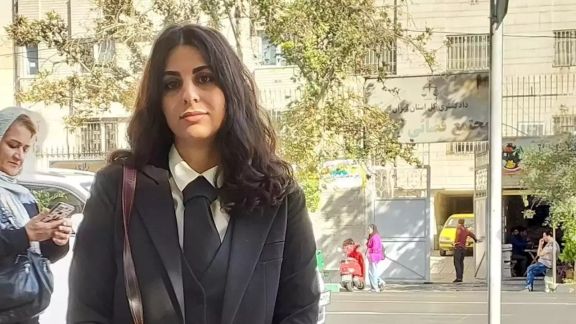
Anti-hijab activist Sepideh Rashno has been sentenced to six months' imprisonment in her latest case amid Iran's hardening hijab laws.
The young woman was denied a presence at her own trial in Tehran after announcing on social media that she would not wear hijab at the court.
She has also been fined 10 million Iranian rials in cash and banned from using Instagram for one year. Her current Instagram page was banned entirely.
It is the hijab rebel's second time in prison, first arrested in July last year after a video of her quarrel with a woman verbally assaulting her for being unveiled on public transport went viral, long before the national uprising of the Women, Life, Freedom movement.
She was later forced into a televised confession, clearly bruised, showing signs of torture. At the time, the US-based Human Rights Activists News Agency said she was taken to hospital with internal bleeding shortly after her arrest and before her appearance on television, when she was covered with her mandatory hijab.
She was released from Tehran’s Evin prison after about 40 days with a bail of what is believed to be $27,000, a huge sum for ordinary Iranians already forced into dire economic straits in a flagging economy.
The young writer and translator was initially convicted of "association and collusion with the intent of endangering national security" and "propaganda against the Islamic Republic," resulting in a five-year suspended prison sentence in December. However, she faced fresh charges of "promoting moral corruption" and "propaganda against the regime" after sharing a photo without hijab on social media.
Rashno revealed on Sunday through her Instagram account that the new sentence effectively ends the suspension of three years and seven months from her initial case. Consequently, she now faces a total of four years and one month of imprisonment.
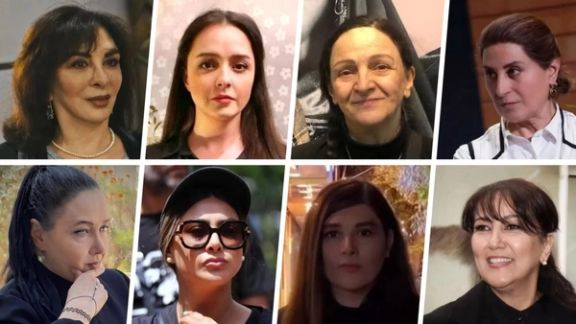
Prominent actresses banned for hijab defiance and supporting protests say not acting is a choice they made to protect their professional dignity before being banned.
“My honor does not allow me to act in [Iran's highly controlled] film industry. Who are you [to ban me]?” Katayoun Riahi said on Instagram in a post that included the photos of the twenty colleagues who were officially banned from acting earlier this week. “I never believed [in the necessity of wearing] the hijab to have ‘removed’ mine now,” she told Iran International TV in November.
“I said goodbye to the world of acting when I was in solitary confinement at Evin prison,” Hengameh Ghaziani, who has also been banned, wrote in an Instagram post. Referring to her interviews with Persian-language media outside Iran, Ghaziani was indicted for “contact with hostile and anti-revolutionary media”.
Pantea Bahram, another banned actress, said in an Instagram story after the release of the list that being banned is the least of her concern, with so many protesters still in prison, and when young girls and boys lost their eyes to the bullets of security forces during the crackdown on protesters in 2022 and 2023.
The ban has met much criticism from others in the film industry. “I feel ashamed of looking at the list in which there are the names of no men. I’m proudly standing with my [female] colleagues until they return [to work],” Mohammad Rezayi-Rad, theater director, announced on Instagram.

Iranian actresses are required to cover their hair in the films they play. The ministry enforces the hijab, as well as censorship of content, by rejecting scripts or modifying them and refusing a public screening license if a film does not meet their requirements.
Banned actresses expressed solidarity with protesters and the anti-hijab movement, often posting photos of themselves without headscarves during last year’s nationwide protests following Mahsa Amini's death in custody.
Riahi, 62, and two other celebrity actresses, Golab Adineh and Fatemeh Motamed-Aria, also showed up with no headscarves at the funeral of popular film director, Kiumars Pourahmad, who tragically ended his own life in April.
Speaking to reporters on the sidelines of a cabinet meeting Wednesday Islamic Guidance Minister Mohammad-Mehdi Esmaili confirmed the ban earlier announced by a ministry official in charge of the film industry.
“We announced before that abidance by the hijab is a legal requirement … I have said several times that those who do not abide by the law cannot work [in the film industry],” Esmaili said.
The list of the banned actresses was released on the same day by the director of the supervision department of the ministry’s Cinema Organization, Habib Ilbeigi.
Some of these celebrities, including Riahi, were arrested for their hijab rebellion. Riahi had to apologize for her defiance under duress during her trial last December. Unable to bear the relentless psychological torment, she passed out and had to be taken to hospital by ambulance. The trial was being filmed, apparently for airing on the state television to discourage others from following suit.
Actresses' open rejection of hijab led to some losing roles in TV sitcoms, the cancellation of entire shows, and censorship of their previous films.
In November last year, House of Cinema, formerly known as the Iranian Alliance of Motion Picture Guilds, said 100 filmmakers and other movie, music and theater personalities had been arrested or banned from work since the Mahsa Movement protests began in mid-September 2022.